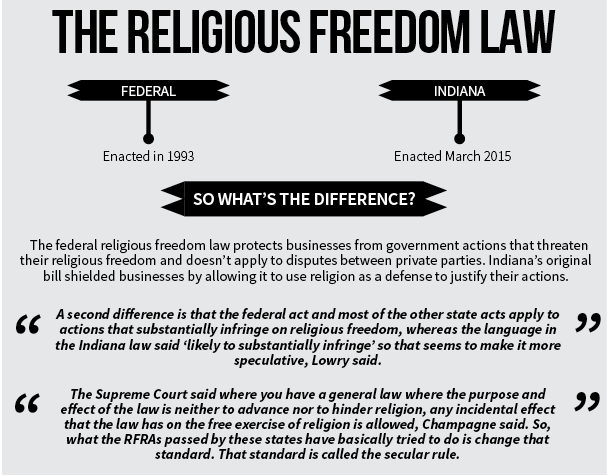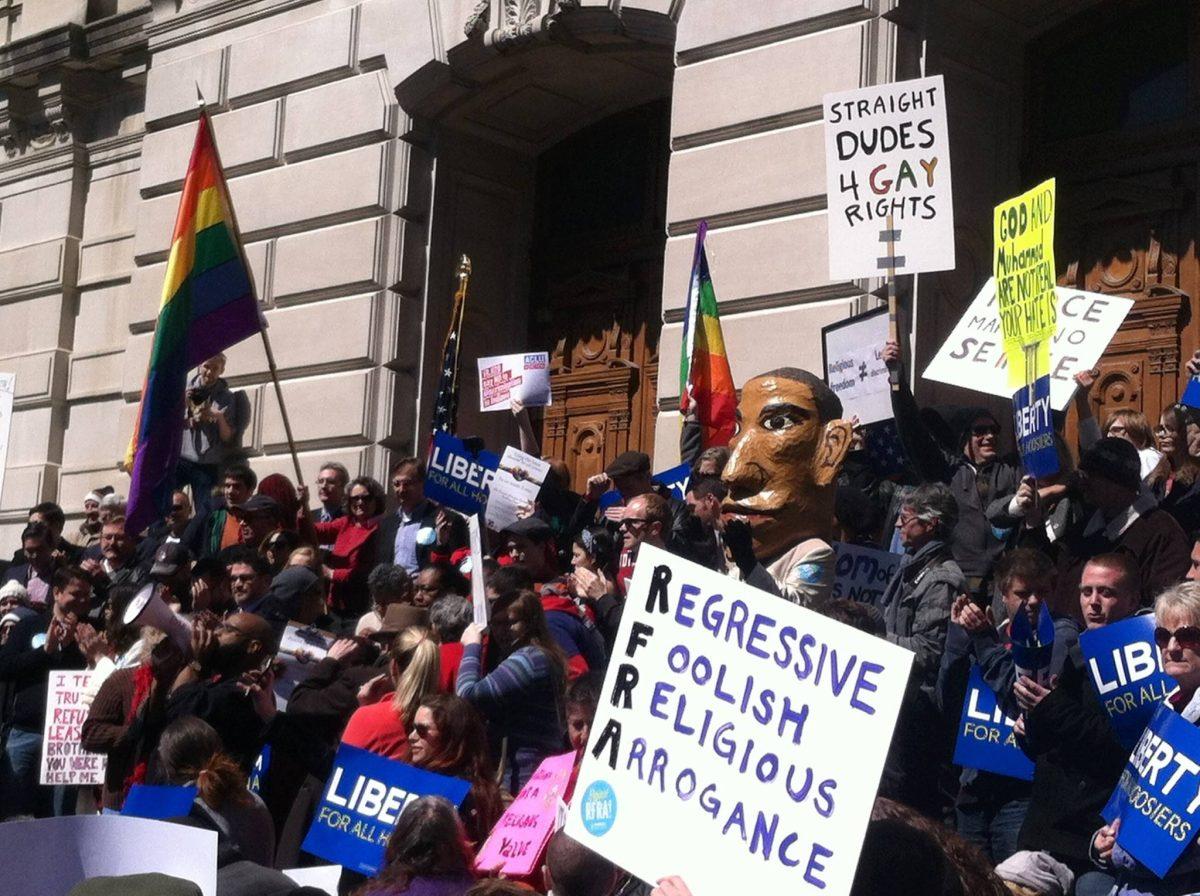Indiana’s religious freedom law fuels talks as campaigns begin, Supreme Court inches toward ruling on same-sex marriage
A month after Indiana Gov. Mike Pence passed an amendment protecting LGBTQ citizens from discrimination in the state’s Religious Freedom Restoration Act, the law’s implementation could have an effect on an upcoming Supreme Court ruling and the presidential elections.
Pence approved the amendment to the IRFRA on April 2. The original act passed caused controversy over whether it it simply gave people more leeway to practice the mandates of their religion or if it allowed businesses to discriminate against customers.
Before the amendment, the act gave businesses a strong defense if they denied service to customers of the LGBTQ community by allowing them to use their religious beliefs to justify their actions. 
After receiving backlash for signing the law, Pence made a statement before approving the amendments.
“I called upon the Indiana General Assembly to clarify that this new judicial standard would not create a license to discriminate or to deny services to any individual as its critics have alleged,” Pence said in the statement.
The political context within which it was passed increases its controversial impact. On April 28, the Supreme Court will begin to hear oral arguments about whether or not laws against same sex marriage are a violation of the equal protection clause.
“Many people, including myself, believe that the Supreme Court will hold that laws against same-sex marriage violate the equal protection clause,” said political science professor Anthony Champagne. “I think the perception of the Indiana law is (that) it is so close in time to this Supreme Court case that this was a way of providing a legal justification to discriminate against what will soon be legal same-sex marriage.”
This law, which will be enacted on July 1, will have an effect on the Republican primaries, said Robert Lowry, professor and program head in the School of Economic, Political and Policy Sciences. He also thinks it will deepen the divide between Republican social conservatives, who are aligned with thereligious right, and mainstream, business-oriented Republicans.
Pence is considering running for president in the 2016 campaign and his chances are affected by the enactment of this law, Lowry said.
“This did not help his chances,” Lowry said. “He approved the original law, and if you listened to the interest groups that supported it, they were supporting exactly what the critics were against.”
Champagne said he believes the IRFRA won’t have an effect on the presidential election.
“I can see this becoming an issue if the Supreme Court decides the way I think it will…,” Champagne said. “But I’m not sure this is a big enough issue to have legs to continue into the presidential election absent that Supreme Court decision.”
There are two implications to this law. One, it’s not limited to Indiana because a similar response was heard for an identical law in Arkansas.
“The other thing — the more important thing — is the extraordinarily negative reaction by the business community,” Champagne said. “I think that that has been quite remarkable; where the business community has basically said, ‘We don’t want this law. It’s bad for the state’s reputation, it’s bad for business and we’re opposed to this law.’”
Supporters of LGBTQ rights and corporations such as Angie’s List, Apple Inc. and the NCAA protested the original law’s approval.
There are two things that make the IRFRA especially controversial, Champagne said. First, the IRFRA had no provision like Texas’s does where the RFRA doesn’t supersede civil rights laws.
The standard held over the past 50 years is that those involved in commerce need to serve all the public, Lowry said. Government has to consider that if it let’s people use religion as a basis to justify their actions, it becomes a convenient excuse that could cover the real reasons.
 “My first reaction was, ‘Why do we need the law at all?’,” Lowry said. “Although, I tend to agree with the way the federal law has it — which is government actions that interfere with religious practices require a compelling justification and should be the least restrictive way of doing it.”
“My first reaction was, ‘Why do we need the law at all?’,” Lowry said. “Although, I tend to agree with the way the federal law has it — which is government actions that interfere with religious practices require a compelling justification and should be the least restrictive way of doing it.”
The concepts of free exercise of religion and the separation of church and state are two entirely different things. They overlap in the sense that if an exception is carved for the free exercise of one religion, it could seem as if the government is favoring that religion over others, thus establishing that religion, making it an issue involving the separation of church and state.
“There’s always been this big dispute about exactly what the separation of church and state means,” Lowry said. “Does it mean just that, a brick wall, no connection, no involvement between the government and religion? Or does it mean that the government has to be even handed in the way it treats all religions.”
Chief Justice William Rehnquist wrote about these two separate constitutional concepts and how they overlapped through what he called “play in the joints,” that in deciding one way on one of these issues you’re creating problems regarding the other, Champagne said.
“My own view is that the whole idea of carving out exceptions to allow for free exercise is probably a mistake,” Champagne said. “I wouldn’t even have RFRAs, I would maintain the secular rule. The RFRAs in general have been used very little since they’ve been passed and I think that’s some indication that the secular rule were correctly decided.”








